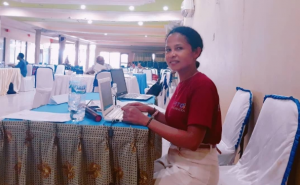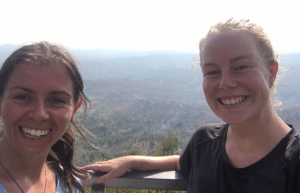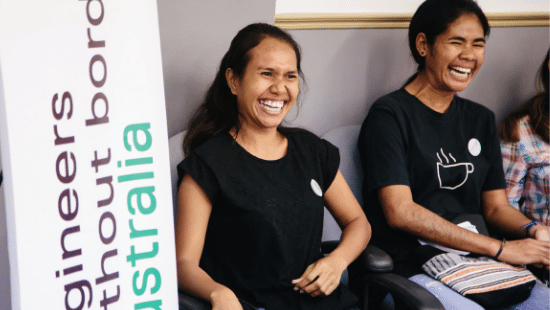EWB Australia’s work in the Asia Pacific region has deep impact due to the multi-layered partnerships that have been fostered. COVID-19 has demanded that we adjust and strengthen these partnerships – to be supporting both response and recovery phases – with a focus on health, social cohesion and stability. Australia’s Department of Foreign Affairs and Trade through its Australian NGO Cooperation Program (ANCP) has developed its ‘Partnerships for Recovery’, which recognises the need to continue to support these communities at this critical moment. As our major funding partner, it means EWB’s work in Cambodia, Timor-Leste and Vanuatu has continued and has adapted with DFAT’s support, in light of the immediate challenges in our world.
The pandemic represents one of the most profound challenges to economic development and human wellbeing in a century. The initial effects have been felt most heavily in wealthier countries. But the eventual impacts are likely to be most acute across the developing world, including in Australia’s near region.
It means the pandemic will exacerbate the inequalities and hardships faced by already vulnerable groups – those groups that EWB works to support. There are two groups at particular risk –
- Women and girls: who are at greater risk of exposure to the virus due to their disproportionate role in the health system, and as carers. Rates of gender-based violence are increasing around the world as restrictions on movement are imposed, economies are closed down and unemployment rises;
- People with disabilities: who already face multiple levels of exclusion, and will be particularly vulnerable as health and other social services are disrupted.
In addition, our region contains ten of the fifteen countries considered most at risk of natural disasters and the effects of climate change. Disasters and extreme weather events could compound the effects of the pandemic and undermine efforts to build prosperous, stable and resilient nations.
EWB is committed to tackling these new challenges alongside existing ones, together with our partners, in the interests of the community. EWB’s Engineering program has a proven track record of long-term, equitable partnerships that work with a shared purpose of creating an equitable reality for the planet and its people. Our partners bring a unique and intimate knowledge of local communities with whom we work, and ensure the technology developed is aligned to community needs and values. In addition, EWB Australia is committed to supportive partnerships and building the technical capacity of our partners through training and upskilling our partners specifically in EWB’s approach to technology development.
Importantly, EWB places a strong focus on localising our assistance. Through EWB Australia offices in Dili (Timor-Leste), Phnom Penh (Cambodia), and Port Vila (Vanuatu) we employ local staff, which ensures our efforts are informed by local knowledge, support local priorities, and contribute to local capacity and accountability.
In Cambodia, new sanitation guidelines provide critical foundations for pandemic preparedness
In Cambodia, EWB is working with the Ministry of Rural Development to achieve universal rural sanitation by 2025. With over a quarter of Cambodians (approximately four million people) living in challenging environments where sanitation infrastructure is particularly difficult to implement and maintain, there must be an urgent focus on sanitation in challenging environments in order to achieve these ambitious water and hygiene goals. EWB’s response has been to address this through an additional focus on sanitation technology solutions for challenging environments, and through education and training programs that address the unique requirements of these areas.
Partnership Snapshot
Partner: the Ministry of Rural Development in Cambodia (MRD)
EWB Australia has been in partnership with MRD since 2016. In June 2019, EWB finalised a major piece of work to deliver the Sanitation In Challenging Environments (SCE) guiding principles. These principles define the key issues of SCE in Cambodia, facilitate a coordinated and consistent approach, and provide information about appropriate sanitation technologies for the very diverse range of challenging environments across the country.
Creating these principles was a highly consultative process, and included government (national and provincial), NGOs, UNICEF, the World Health Organisation, alongside organisations representing people with disabilities, gender stakeholder, and communities themselves.
Sixteen months on, the SCE Guiding Principles are being implemented, with support from EWB Australian Volunteer field professional Laura Prickett. Laura commenced work with MRD in November 2019, but was repatriated back to Australia due to COVID19 in March 2020.
Laura has continued remote support, conducting capacity assessments to ensure these guiding principles can be effectively adopted and progressed across the countries differing provinces. As co-chair of the SCE technical team, we work to improve coordination, harmonise technical and strategic advice-related designs, conduct pilots, reviews and scale-ups of appropriate and affordable new technologies, and innovate approaches and tools for SCE implementation in Cambodia.
In adapting partnerships for recovery in a COVID-19 world, EWB has provided technical inputs and guidance to MRD and its Department of Rural Water Supply (DRHC) to deliver COVID-19 awareness-raising campaigns into all provincials, districts, communes, villages, households, referral hospitals and health centres.
This work has included technical assistance to the MRD in developing and implementing a COVID-19 response plan at national level, and subsequent development of monitoring and evaluation plans, as well as training of trainers, to support hygiene promotion and responsible social behaviour campaigns.
Many Dy, Country Manager, EWB Australia in Cambodia, is leading EWB on-the-ground efforts in Cambodia. Says Many:
“As well as technical support, EWB has also been coordinating the distribution of hygiene promotion materials, installing hand washing stations, activating handwashing practice at community events, as well as supporting a social and mainstream media COVID-19 awareness campaign, which are being implemented by the Provincial Department of Rural Developments, local authorities and supported by development partners and local NGO partners.”
MRD has found that in the provinces where the COVID-19 campaign was supported by NGO partners, such as EWB, the response at a community level was much higher. With NGO support, more activities were able to be run, and a greater number of community members were able to be reached. MRD is committed to meeting every two weeks with the COVID-19 task force and sees strength in having NGO partners such as EWB support the response.
In Timor-Leste, sharing insights into women’s barriers to the sector progresses a critical conversation
In Timor-Leste, EWB continues to partner with organisations that work towards strengthening the capacity of Timorese women to participate in technical and engineering professions. Our EWB network in Timor-Leste is also addressing hygiene awareness that is focused on COVID-19 mitigation.
Partnership Snapshot
Partner: Feto Enginhera (Women in Engineering)
Feto Enginhera (FE) was formed in 2014 to support the technical and engineering careers of women in Timor-Leste. Less than 1 in 5 Timorese engineering graduates are females and even fewer females continue on to develop an engineering career due to various cultural and family influences.
A critical source of peer support and advice, the group has recently completed a project in collaboration with EWB to map the barriers to female participation in the technical workforce in their country.
The report aims to highlight the challenges and explore solutions to resolve the issues – of which there are many. The mapping outlined instances of sexual harassment, inappropriate sanitation on worksites, inadequate parental leave, remote locations, and lack of safety and security. This report is now being presented across the engineering and technical sectors in Timor-Leste, as a starting point to explore the critical change that is needed to better support and enable women in the sector.
“There is now a change happening in the culture and mindsets of people in Timor-Leste. In the past the role of females in the community was limited to childcare and domestic duties. After sharing with my family some knowledge I learnt from Feto Enginhera, my family are supportive of my choice to become an engineer. It makes me proud and happy to have the opportunity to do what I want and follow my aspirations. There is still a lot that can be improved, so that all women in Timor-Leste have the opportunity to do what they want to in life, and to have equal opportunities as professionals.”
– Elsa Ximenes, FE member and EWB Program Officer.
You can read the Mapping & Overcoming Barriers summary report here.

Isabel representing FE at a WaterAid Timor-Leste WASH discussion forum
EWB has also collaborated with FE to support passionate young female engineers in Timor-Leste to build skills and confidence through the “Crossing Borders” program. This program pairs participants from Australia and Timor-Leste with the primary aim of giving opportunity for conversational English and mentoring. The program has seen 20 participants meet fortnightly to build mentoring relationships and cover topics from family, friends and cooking to study, job searching and resume writing.
“Feto Enginhera has taught me so many skills and lessons. Before being involved with Feto Enginhera I was so scared to speak in public. Now, I have the confidence to facilitate activities, to work in teams and even how to lead a team. FE provides a place where I can meet friends with different backgrounds and we can support each other. Through the Crossing Borders program, I can practice English and share experiences with my Australian mentor and we both really enjoy it. Before I was a member of FE, I considered engineering as just Civil Engineering, Mechanical Engineering and Petroleum Engineering. Now I know that engineering is in everything, engineering is everywhere. My hope for the future is that FE will be a strong, independent organisation and set an example for women’s empowerment in Timor-Leste so that engineering can also include everyone.”
– Isabel Afonso, FE member and Crossing Borders Participant
COVID-19 hygiene awareness

Abigail (left) with Alex (EWB Australian Volunteer Field Professional at PLAN International) on a hiking weekend in Ossu, Timor-Leste.
COVID-19 hygiene awareness is also in progress, with EWB’s engineering network in Timor-Leste. This network, which includes students, graduates, professionals and NGOs, has developed and delivered COVID-19 targeted hygiene promotion and responsible social behaviour campaigns. This project is now complete and the communications platform which includes a Facebook page titled Hamutuk ita Forsa or “Together we are strong” has been handed over to our partner organisations – GIZ and Pradet – to continue this work.
EWB also continues to work with partners to strengthen the capacity of the WASH sector in Timor-Leste to effectively coordinate strategies and share technical WASH solutions. Abigail Neave, an Australian Volunteer Field Professional, spent time with WaterAid Timor-Leste before the pandemic hit.
“I was fortunate enough to spend eight months working with WaterAid Timor-Leste (WATL) until I returned to Australia due to COVID-19. My focus was on water and sanitation hygiene (WASH) – in particular menstrual hygiene management – and inclusive WASH. Working in this space required the development of many relationships across WATL, EWB Timor-Leste, FE, other partner organisations, such as Ra’es Hadomi Timor Oan (RHTO), a disability advocacy group, and within communities. My role involved capacity development within the engineering team, both in technical design skills and in design development processes. It was a privilege to be a part of such an inspiring group of people who are passionate about creating positive change.”
– Abigail Neave
EWB has worked with our partners to pivot our programs to include COVID-19 response strategies and plan for the way forward; to create partnerships for recovery. Now more than ever, our local partners play a critical role to engage and mobilise their local communities. They work with us to maintain our connection with the communities we serve, to develop and test technology, and collect crucial monitoring and evaluation information.
EWB’s international program is supported by the Australian NGO Cooperation Program (ANCP) and with support from generous donors. You can support our program – please donate today.


